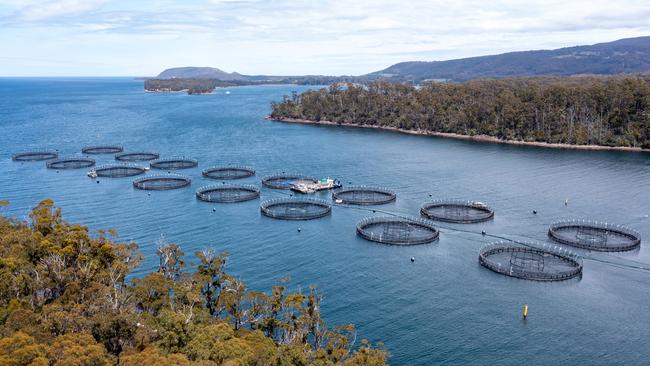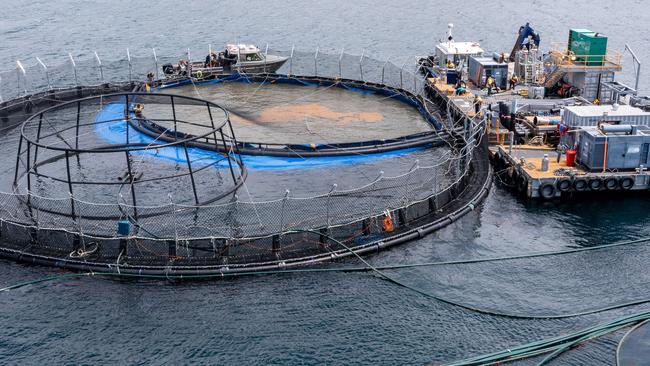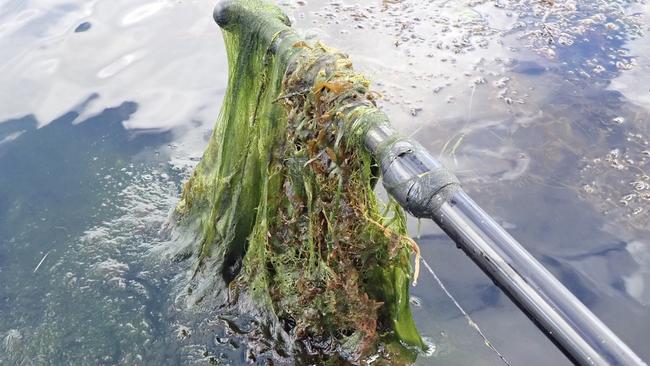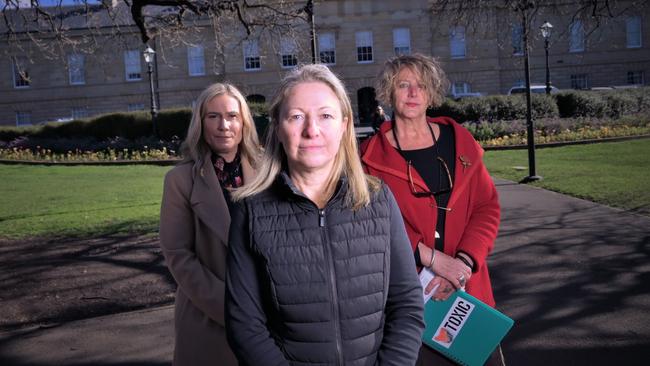Long Bay salmon farming causing nutrient enrichment on reef: Report
A new scientific report has confirmed waters off Port Arthur, leased by Tassal since 2017, are “sensitive and susceptible” to nutrient enrichment, some of which is being caused by the salmon.
Tasmania
Don't miss out on the headlines from Tasmania. Followed categories will be added to My News.
A NEW scientific report examining waters off Port Arthur which have been leased by Tassal for salmon farming since 2017 has confirmed the fish pens are “a source of nutrients for the adjacent reef ecosystem”, leading to elevated levels of kelp-smothering algae.
The February ‘Rapid visual assessment of rocky reef assemblages in Port Arthur’ study was written and released by the University of Tasmania’s Institute for Marine and Antarctic Studies.
Its contents should set off “alarm bells” for the state government, said Trish Baily, a spokeswoman for green group Tasman Peninsula Marine Protection (TPMP), which has been campaigning for the removal of Tassal’s 16 pens in Long Bay.

The study, which involved assessing 15 sites surrounding the salmon pens at distances of 100m, 400m and 1000m, concluded all sites displayed “nutrient enrichment”, with elevated levels of several types of algae.
However, the nutrient enrichment at the 400m and 1000m test sites “is likely to also be affected by terrestrial nutrient sources”.
“Attribution of these effects to salmon farming is problematic,” the study said.
The evidence was much clearer at the closest test sites.
“The results at 100m sites are consistent with the influence of nutrient enrichment from the salmon lease on the local rocky reef assemblage,” the study said.
“Nitrogen isotope data also confirms that the salmon farm is a source of nutrients for the adjacent reef ecosystem.”
The study said that regardless of where the nutrients came from, the results “highlight the susceptibility... (and) sensitivity of low-exposure sites with reduced flushing to the effects of nutrient enrichment”.

TPMP, Tassal and the Tasmanian Salmonid Growers Association (TSGA) have all claimed the report vindicates them.
Ms Baily, who said under the terms of Tassal’s lease there should be no nutrient enrichment further than 35m away from the pens, labelled the study “damning”.
“This clearly indicates that the nutrient input from the salmon lease at Long Bay is causing a deterioration of the reef habitat and the cause of the damaging nuisance algal blooms that have plagued the area,” she said.
A Tassal representative, meanwhile, claimed that scientific studies it commissioned in 2013 prior to re-establishing farming in Long Bay indicated the area was already susceptible to certain types of nuisance algae.
The representative emphasised the study’s conclusion that land-based nutrient run-off also contributed to the issue.

“Like all farmers, Tassal acknowledges that farming operations have an acceptable localised impact directly adjacent to our lease areas and is proud to maintain a 100 per cent compliance record and is committed to continued environmental monitoring,” the representative said.
TSGA chief executive Sue Grau called on TPMP to support the salmon industry’s “broad push for the integrated management of ecosystems in which we operate, like (Long Bay), so that all activities or sectors that potentially have an impact are included”.
She said the study was far more equivocal than claimed by groups such as TPMP.
LONG-TIME KAYAKER SAYS IT’S ‘PARADISE PENINSULA’ NO MORE
By Kenji Sato
NTI-salmon farming activists have clutched their “I told you so” moment, after IMAS releases its report demonstrating a link between salmon pens near Port Arthur and noxious algal blooms.
Activists gathered outside Parliament House brandishing copies of the report, demanding Primary Industries Minister Jo Palmer shut down the salmon farming operations.
One of them was Tasman Peninsula Marine Protection Group’s Fiona Housego, who has lived and kayaked in the area for the past 10 years.
Ms Housego said it was once known as the beautiful “paradise peninsula”, but had watched her kayaking spots become choked with algae over the years.
“For the last 3½ years we have been continually knocking on EPA’s door complaining about the algal blooms in Long Bay,” Ms Housego said.
“Long Bay Port Arthur is totally unsuitable for salmon farming and the evidence continues to mount.”

Tasmanian Alliance for Marine Protection co-chair Sheenagh Neill said the science “validated” what the locals suspected all along.
Ms Neill said they wouldn’t accept half-measures, and wanted the salmon pens removed from Long Bay.
“You cannot cherry pick around the results. There is enough evidence to say it is time for Tassal to exit Long Bay, ” he said.
“The EPA should do more than just welcome the long-awaited report, they must act.”
A government spokesperson said it would take the new report on board when considering the future of Tasmania’s salmon industry.
The spokesman said the government would consider the report in the context of the its 10-year plan for a sustainable and continually-improving salmon industry.
“I note the EPA has released a report by IMAS on algal growth in Long Bay, including potential impacts from a salmon lease within the Bay,” the spokesperson said.
“The EPA will continue to monitor the situation in Long Bay and will consider the need for any management responses in light of this most recent information.”
Independent MP Kristie Johnston said the salmon industry was a “stain” on the Tasman Peninsula that needed to be cleaned up.
“The science is very clear: salmon farming at Long Bay is causing immense harm to the local environment,” she said.
“It is time that minister Palmer stepped up to the plate, listened to the community, took note of the science, acted, and have salmon farming removed from Long Bay.”




